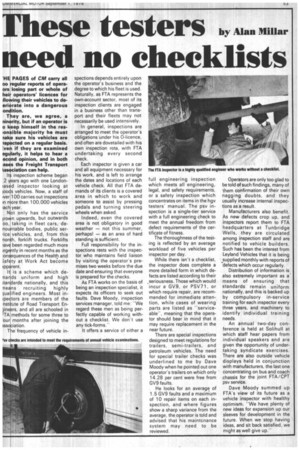Th ese testers by Alan Millar
Page 55

If you've noticed an error in this article please click here to report it so we can fix it.
need no checklists
HE PAGES of CM carry all oo regular reports of operaors losing part or whole of heir operators' licences for iflowing their vehicles to deerierate into a dangerous endition.
They are, we agree, a ninority, but if an operator is o keep himself in the realm able majority he must nak sure his vehicles are isi cted on a regular basis. :vs if they are examined eg larly, it helps to hear a ec nd opinion, and in both s the Freight Transport 155i ciation can help.
It inspection scheme began 2 ears ago with one Londonas :d inspector looking at roo s vehicles. Now, a staff of iver 1 00 carries out inspections in ore than 100,000 vehicles iac year.
N t only has the service ro n upwards, but outwards oo, taking in fleet cars, deno ntable bodies, public ser,ice vehicles, and, from this non h, forklift trucks. Forklifts lay been regarded much more Jrg tly in recent months as the :on quences of the Health and 3af ty at Work Act become ipp rent.
I is a scheme which dena ds uniform and high ;tan ards nationally, and this ne ns recruiting highly iva ified engineers. Most inipe tors are members of the nsti ute of Road Transport En rs, and all are schooled in 'TA methods for some three to our months after joining the iss iation.
T e frequency of vehicle in
spections depends entirely upon the operator's business and the degree to which his fleet is used. Naturally, as FTA represents the own-account sector, most of its inspection clients are engaged in a business other than trans port and their fleets may not necessarily be used intensively.
In general, inspections are arranged to meet the operator's obligations under his 0-licence, and often are dovetailed with his own inspection rota, with PTA undertaking every second check.
Each inspector is given a car and all equipment necessary for his work, and is left to arrange the dates and locations of each vehicle check. All that FTA demands of its clients is a covered area in which to work and someone to assist by pressing pedals and turning steering wheels when asked.
Indeed, ever the covered area is not obligatory in good weather — not this summer, perhaps! — as an area of hard standing is sufficient.
Full responsibility for the inspections rests with the inspector who maintains field liaison by visiting the operator's premises two weeks before the due date and ensuring that everyone is prepared for the checks.
As FTA works on the basis of being an inspection specialist, it expects its officers to seek out faults. Dave Moody, inspection services manager, told me: -We regard these men as being perfectly capable of working without a checklist. We don't use any tick-forms.'"
It offers a service of either a full engineering inspection which meets all engineering, legal, and safety requirements, or a safety inspection which concentrates on items in the hgv testers' manual. The psv inspection is a single-tier service with a full engineering check to meet the annual freedom from defect requirements of the certificate of fitness.
The thoroughness of the testing is reflected by an average workload of five vehicles per inspector per day.
While there isn't a checklist, the inspector does complete a more detailed form in which defects are listed according to their ,seriousness. Those which would incur a GV9, or PSV71, or which require repair, are recommended for immediate attention, while cases of wearing parts are listed as "serviceable-, meaning that the operator should bear in mind that it may require replacement in the near future.
There are special inspections designed to meet regulations for trailers, semi-trailers, and petroleum vehicles. The need for special trailer checks was underlined to me by Dave Moody when he pointed out one operator's trailers on which only 14,28 per cent were free from GV9 faults.
He looks for an average of 1.5 GV9 faults and a maximum of 10 repair items on each inspection, and where figures show a sharp variance from the average, the operator is told and advised that his maintcnance system may need to be reviewed. Operators are only too glad to be told of such findings, many of them confirmation of their own nagging doubts, and they usually increase internal inspections as a result.
Manufacturers also benefit. As new defects crop up, and inspectors report them to FTA headquarters at Tunbridge Wells, they are circulated among inspection staff and are notified to vehicle builders. Such has been the interest from Leyland Vehicles that it is being supplied monthly with reports of defects which occur regularly.
Distribution of information is also extremely important as a. means of ensuring that standards remain uniform nationally, and this is backed up by compulsory in-service training for each inspector every three years, and machinery to identify individual training needs.
An annual two-day conference is held at Solihull at which staff hear papers from individual speakers and are given the opportunity of undertaking syndicate exercises. There are also outside vehicle displays held in conjunction with manufacturers, the last one concentrating on bus and coach chassis for the joint FTA /CPT psv service.
Dave Moody summed up PTA's view of its future as a vehicle inspector with healthy optimism. "We have plenty of new ideas for expansion up our sleeves for development in the future. When we stop having ideas, and sit back satisfied, we might as well give up."




































































































